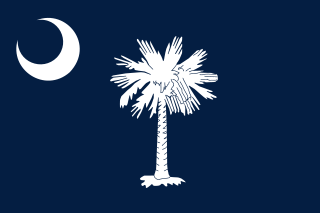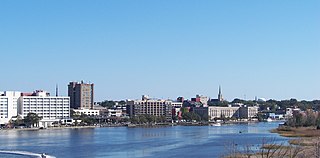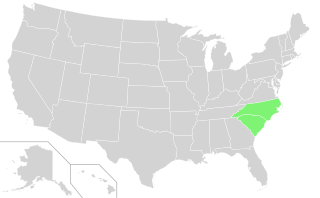
North Carolina is a state in the Southeastern region of the United States. It borders Virginia to the north, the Atlantic Ocean to the east, South Carolina to the south, Georgia to the southwest, and Tennessee to the west. The state is the 28th-largest and 9th-most populous of the United States. Along with South Carolina, it makes up the Carolinas region of the East Coast. In the 2020 census, the state had a population of 10,439,388. Raleigh is the state's capital and Charlotte is its largest city. The Charlotte metropolitan area, with a population of 2,728,933 in 2020, is the most-populous metropolitan area in North Carolina, the 21st-most populous in the United States, and the largest banking center in the nation after New York City. The Raleigh-Durham-Cary, NC Combined Statistical Area is the second-largest metropolitan area in the state and 32nd-most populous in the United States, with a population of 2,238,315 in 2020, and is home to the largest research park in the United States, Research Triangle Park.

South Carolina is a state in the coastal Southeastern region of the United States. It borders North Carolina to the north, the Atlantic Ocean to the southeast, and Georgia to the southwest across the Savannah River. Along with North Carolina, it makes up the Carolinas region of the East Coast. South Carolina is the 40th-largest and 23rd-most populous U.S. state with a recorded population of 5,124,712 according to the 2020 census. In 2019, its GDP was $213.45 billion. South Carolina is composed of 46 counties. The capital is Columbia with a population of 137,300 in 2020; while its largest city is Charleston with a 2020 population of 150,277. The Greenville-Spartanburg-Anderson, SC Combined Statistical Area is the most populous in the state, with a 2020 population of 1,487,610.

Charlotte is the most populous city in the U.S. state of North Carolina. Located in the Piedmont region, it is the county seat of Mecklenburg County. The population was 874,579 at the 2020 census, making Charlotte the 15th-most populous city in the United States, the seventh-most populous city in the South, and the second-most populous city in the Southeast behind Jacksonville, Florida. The city is the cultural, economic, and transportation center of the Charlotte metropolitan area, whose 2020 population of 2,660,329 ranked 22nd in the United States. Metrolina is part of a sixteen-county market region or combined statistical area with a 2020 population of 2,822,352.

Raleigh is the capital city of the U.S. state of North Carolina and the seat of Wake County. It is the second-most populous city in North Carolina, after Charlotte. Raleigh is the tenth-most populous city in the Southeast, the 41st-most populous city in the U.S., and the largest city of the Research Triangle metro area. Raleigh is known as the "City of Oaks" for its many oak trees, which line the streets in the heart of the city. The city covers a land area of 147.6 sq mi (382 km2). The U.S. Census Bureau counted the city's population as 467,665 in the 2020 census. It is one of the fastest-growing cities in the United States. The city of Raleigh is named after Sir Walter Raleigh, who established the now-lost Roanoke Colony in present-day Dare County.

The University of North Carolina is the multi-campus public university system for the state of North Carolina. Overseeing the state's 16 public universities and the NC School of Science and Mathematics, it is commonly referred to as the UNC System to differentiate it from its flagship, UNC-Chapel Hill.

The University of North Carolina at Chapel Hill is a public research university in Chapel Hill, North Carolina. After being chartered in 1789, the university first began enrolling students in 1795, making it one of the oldest public universities in the United States.

Asheville is a city in, and the county seat of Buncombe County, North Carolina, United States. Located at the confluence of the French Broad and Swannanoa rivers, it is the most populous city in Western North Carolina, and the state's 11th most populous city. According to the 2020 census, the city's population was 94,589, up from 83,393 in the 2010 census. It is the principal city in the three-county Asheville metropolitan area, which had a population of 469,015 in 2020.

Wilmington is a port city in and the county seat of New Hanover County in coastal southeastern North Carolina, United States. With a population of 115,451 in the 2020 census, it is the eighth-most populous city in the state. Wilmington is the principal city of the Wilmington, NC Metropolitan Statistical Area, which includes the Pender, and Brunswick counties in southeastern North Carolina as well as New Hanover county. Its metropolitan statistical area had a population of 285,905 in 2020.

The governor of North Carolina is the head of government of the U.S. state of North Carolina. Seventy-five people have held the office since its inception in 1776. The governor serves a term of four years and chairs the collective body of the state's elected executive officials, the Council of State. The governor's powers and responsibilities are prescribed by the state constitution and by law. They serve as the North Carolina's chief executive and are tasked by the constitution with faithfully carrying out the laws of the state. They are ex officio commander in chief of the North Carolina National Guard and director of the state budget. The office has extensive powers of appointment of executive branch officials, some judges, and members of boards and commissions. Governors are also empowered to grant pardons and veto legislation.

The Carolinas are the U.S. states of North Carolina and South Carolina, considered collectively. They are bordered by Virginia to the north, Tennessee to the west, and Georgia to the southwest. The Atlantic Ocean is to the east.

The North Carolina General Assembly is the bicameral legislature of the state government of North Carolina. The legislature consists of two chambers: the Senate and the House of Representatives. The General Assembly meets in the North Carolina Legislative Building in Raleigh, North Carolina.

The North Carolina Senate is the upper chamber of the North Carolina General Assembly, which along with the North Carolina House of Representatives—the lower chamber—comprises the state legislature of North Carolina. The term of office for each senator is only two years.

The Southeastern United States, also referred to as the American Southeast, the Southeast, or the South, is a geographical region of the United States located in the eastern portion of the Southern United States and the southern portion of the Eastern United States. The region includes a core of states that reaches north to Maryland and West Virginia, bordering the Ohio River and Mason–Dixon line, and stretches west to Arkansas and Louisiana.

Roy Allen Williams is an American retired college basketball coach who served as the men's head coach for the North Carolina Tar Heels for 18 seasons and the Kansas Jayhawks for 15 seasons. He was inducted into the College Basketball Hall of Fame in 2006 and the Basketball Hall of Fame in 2007.

Queen Anne's Revenge was an early-18th-century ship, most famously used as a flagship by Edward Teach, better known by his nickname Blackbeard. The date and place of the ship's construction are uncertain, and there is no record of its actions prior to 1710 when it was operating as a French privateer under the name La Concorde. Surviving features of the ship's construction strongly suggest it was built by French shipwrights, based on differences in fastening patterns in the late 17th and early 18th centuries. After several years of service by French sailors, she was captured by Blackbeard in 1717. Blackbeard used the ship for less than a year, but captured numerous prizes using her as his flagship.

The North Carolina Tar Heels football team represents the University of North Carolina at Chapel Hill in the sport of American football or Gridiron Football. The Tar Heels play in the Football Bowl Subdivision (FBS) of the National Collegiate Athletic Association (NCAA) and are members of the Atlantic Coast Conference (ACC).

The North Carolina Tar Heels Men's basketball program is a college basketball team of the University of North Carolina at Chapel Hill, having one of the greatest traditions in the history of college basketball. The Tar Heels have won six national championships, in addition to a Helms Athletic Foundation retroactive title (1924), and participated in a record twenty-one Final Fours. It is the only school to have an active streak of reaching the National Championship game for nine straight decades and at least two Final Fours for six straight decades, all while averaging more wins per season played (20.7) than any other program in college basketball. In 2012, ESPN ranked North Carolina No. 1 on its list of the 50 most successful programs of the past fifty years.

This is a list of elections in the U.S. state of North Carolina.

The 2024 North Carolina gubernatorial election will be held on November 5, 2024, to elect the governor of North Carolina, concurrently with the 2024 U.S. presidential election, as well as elections to the United States Senate, elections to the United States House of Representatives, and various other state and local elections. Incumbent Governor Roy Cooper is term-limited and cannot seek re-election to a third consecutive term in office. This is the only Democratic-held governorship up for election in 2024 in a state Donald Trump won in 2020. Primary elections took place on March 5, 2024.

















